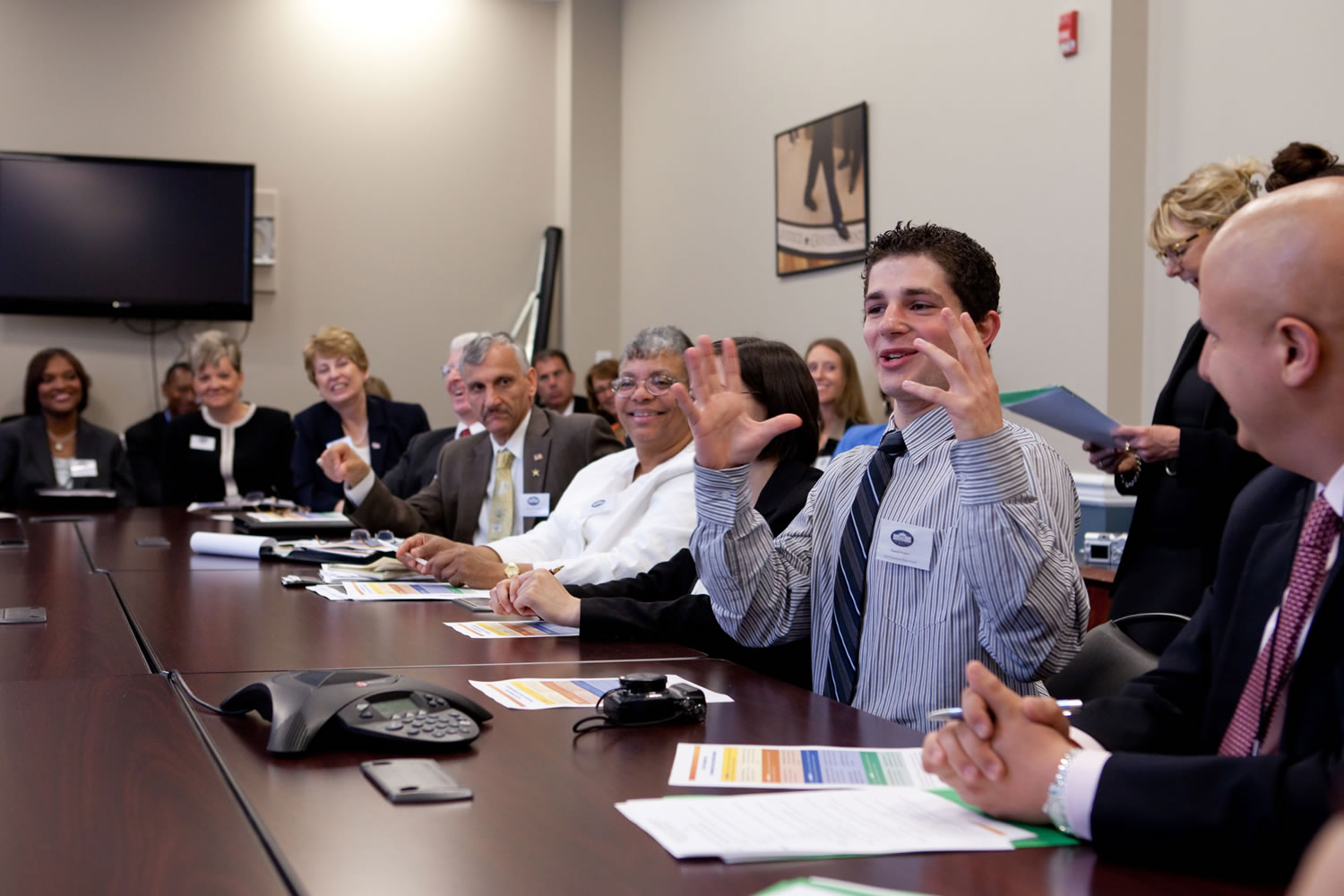Daniil Popov had the federal administrators in stitches.
Sitting in a conference room in the shadow of the White House last month, the 19-year-old described his first day at Vancouver’s Frito-Lay plant to comedic effect.
Popov talked about slowly wandering through the plant that day last summer, in awe of the complex machinery around him. His supervisor, who was moving at a more-efficient clip, had to remind the intern a few times that he wasn’t here for a leisurely tour of the premises.
Popov soon not only ramped up his own speed, but contributed to speeding up the manufacturing process and eliminating waste.
And he found motivation to go to college and pursue a career in engineering, which is why four dozen adults in the nation’s capitol wanted to hear his story last month.
Popov went to Washington, D.C., with several representatives of a Vancouver program that seeks to encourage low-income high school students to go into science or engineering fields. He was one of four students from around the country who shared their career development experience with officials from the federal labor and education departments.
Bridging the gap
The career program is run by nConnect, a nonprofit that received money from the Southwest Washington Workforce Development Council to connect students with Clark County employers.
NConnect started in 2005 to bridge the gap between what teens were learning in math and science classes and what engineering firms needed, said Manlio Castillo, a STEM coach for the nonprofit. STEM stands for science, technology, engineering and math, the skills most needed in today’s — and tomorrow’s — economy, according to experts.
Castillo, a mechanical engineer, started as a volunteer mentor in 2008, going into classrooms to tell students what it’s really like to work in his field.
“(But) I didn’t feel like I was adding a lot more than a (school) counselor,” Castillo said. “Practical experience is invaluable.”
Then the regional workforce council became a partner in the Opportunity Internship Program, a statewide effort to get students started on in-demand careers. Rep. Tim Probst, D-Vancouver, was a driving force behind the program, Greg Kulander, nConnect’s executive director, said.
90-hour internships
The 90-hour internships at companies such as Frito-Lay, SEH America, iQ Credit Union or Reliance Investing get low-income students thinking about “different kinds of jobs that they don’t see around them,” said Jeanne Bennett, executive director of the regional workforce council. “Many have no idea what an engineer does.”
The local program has served about 180 teens, Castillo said. About 25 of them were offered jobs at the end of their internships. And about two-thirds of the most recent group of high school graduates who had gone through the program either enrolled in college or planned to go within one year.
Changed outlook
Popov is no stranger to work. When he was 4, his family immigrated to the U.S. from Uzbekistan, a former Soviet republic that borders Afghanistan. Popov’s father is a tile setter, and the son has helped out in the father’s business often.
The teen has long been interested in math and machines, but when he graduated from Fort Vancouver High School last year, he wasn’t sure if he wanted to go to college.
“I didn’t want my parents to have to pay,” he said. “I didn’t know what I was going to get into.”
A counselor at school suggested he speak with Castillo, who in turn encouraged him to apply for the internship. First-day jitters aside, the experience changed Popov’s outlook on his future.
He and other student interns collected data about Frito-Lay’s equipment performance. They recorded optimal equipment settings that created the least amount of waste, said Jason Studer, a packaging specialist for the company.
“They would verify the machine was running a minimal amount of waste, record the settings, transfer to a spreadsheet and post for future reference,” Studer said.
The company later told nConnect that the students’ efforts saved Frito-Lay some $400,000, by minimizing wasted bags, Castillo said.
And Popov realized that given the proper education and training, he could be doing this kind of analytical work for the rest of his life instead of breaking his back for much less money.
“I thought, ‘If this is what college gives you, I should go,'” Popov said.
Frito-Lay engineers encouraged him, too.
“They said, ‘You should go — you’ll be good at this,'” he said.
He’s now taking classes at Clark College and plans to study engineering at a four-year university after he gets his associate’s degree.
“It’s weird what 90 hours can do,” Popov said.
‘A really good thing’
This year, nConnect sent out an email to alumni of the internship program. The White House was looking to learn more about what works in summer programs geared to connect students with careers. NConnect had been invited to D.C. and told to bring a student.
Some teens might have been intimidated by the prospect. Not Popov.
“I thought, ‘This sounds awesome,'” he said. “I’ve never been to D.C. and I get to meet some big people — it’s a good idea.”
In late May, after some minimal sightseeing and a visit with Sen. Patty Murray, Popov and three other students sat at a table facing 46 government officials, business executives and nonprofit administrators. They asked the teens questions about the guidance they received and how they had benefited from the programs, said Bennett, the director of the workforce council. She and Castillo went with Popov.
“Daniil handled himself beautifully,” Bennett said.
Several business representatives handed Popov their business cards and said to call when he gets his degree, he said. He was impressed that so many people spent time, energy and money to help youth, he said.
“I just hope that I got the story out that this is a really good thing to do,” he said.
And while he was flattered by the attention and potential job prospects from East Coast companies, he’s not sure he’ll be calling them.



